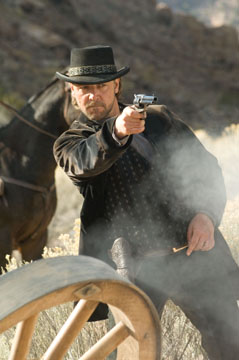 Russell Crowe wields a mean revolver en route to being placed on the 3:10 to Yuma.
Russell Crowe wields a mean revolver en route to being placed on the 3:10 to Yuma.
|
|
A D V E R T I S E M E N T
|
|
|
|
A D V E R T I S E M E N T
|
|
Desert Dogs
High-falootin’ scootin’ shootin’ sons of guns from Arizona hold up the 3:10 to Yuma.
By KRISTIAN LIN
3:10 to Yuma began life as a Western short story written by Elmore Leonard in 1953, before he made his reputation writing crime fiction. It’s better known, though, in its incarnation as a 1957 black-and-white film, which hasn’t been tagged as a “classic” Western like High Noon or Shane but remains an excellent piece of work. Directed with sharpness and skill by master craftsman Delmer Daves, the movie brought psychological depth to the characters that was missing from the original story.
The current version of 3:10 to Yuma has much more in common with Daves’ film than with Leonard’s original story. Indeed, the 1957 movie’s screenwriter, Halsted Welles, receives partial credit for the DELETE here, which lifts entire scenes’ worth of dialogue from the earlier film. (“Ever work for a blind Irishman in Leadville?”) Yet the remake also contains action sequences invented out of whole cloth, a much higher body count, and a radically altered ending. These elements would be annoying and superfluous if this new version didn’t stand on its own. Fortunately, it does.
Christian Bale plays Dan Evans, an 1860s Civil War vet turned Arizona cattle rancher who’s about to go bust. He and his sons stumble on the aftermath of a bloody stagecoach robbery and come face to face with the perpetrators, a gang led by the notorious outlaw Ben Wade (Russell Crowe). Evans doesn’t interfere for the sake of his boys, but when Wade is arrested soon afterward in the nearby town of Bisbee, Evans volunteers to be part of a posse that will transport Wade to Contention City about 40 miles away and put the bad guy on a train that’ll carry him off to prison in Yuma. Wade’s gangsters are sure to attack the posse, but Evans needs the job’s $200 reward to save his ranch.
I haven’t been a fan of director James Mangold’s previous work, which has roamed through genres ranging from biopic (Walk the Line) to romantic comedy (Kate & Leopold) to thriller (Identity). Still, I have to take my Stetson off to what he does here, which is to make a Western at an appropriately deliberate pace without turning off modern-day audiences raised on fast-paced thrillers.
Mangold’s action sequences are acceptable rather than distinguished, and the climactic shootout makes no sense in light of how much the movie has made of Evans’ crippled leg. Even so, he does well conjuring a world where harsh living conditions and minimal civilizing influences encourages all manner of thuggish behavior. Contention City’s marshal confidently declares that law and order rule in his town, but those evaporate quickly when Wade’s gang arrives, and the marshal and his men are shot down in the street almost as an afterthought. Several members of Evans’s posse are just as vicious as the outlaws, not least of them a twisted nail of a Pinkerton detective (Peter Fonda). The casting of Luke Wilson as a racist railroad foreman who captures and tortures Wade is a glaring error, but the other actors come through magnificently, with the always-creepy Ben Foster making an unforgettable impression as Wade’s second-in-command, a mean little rattlesnake whose full beard can’t disguise the cruelty that sets his jaw and turns down the corners of his mouth.
The rampant villainy is only the backdrop to the real glory of this movie, which is the interchanges between Evans and Wade. This material could easily have turned mawkish in the wrong hands, but Bale’s dry-eyed performance does all kinds of good, particularly in salvaging a potentially sticky subplot with the character trying to be an adequate father to his contemptuous 14-year-old son (Logan Lerman), who joins the posse against his Pa’s wishes. The actor’s reading of Evans’ final speech to his son will squeeze your heart.
Pitted against such an intense screen presence, Crowe responds by dialing his own intensity down. He received lacerating reviews last year when he tried to loosen up in the mawkish drama A Good Year, but that same approach serves him much better in this context. Crowe is once again magnificent, playing Wade as a friendly, witty, dangerously charismatic villain who’s no less murderous for his quick smile, breezy demeanor, and habit of sketching realistic portraits of people on stray pieces of paper. Wade’s no fool, yet he can’t comprehend Evans’ willingness to die bringing him to justice, and the killer’s silver-tongued attempts to buy or scare the rancher off generate the movie’s suspense. Crowe plays Wade as amused and frustrated by turns in the face of Evans’ tenacious moral streak, and it’s really funny to watch him squirm. That same dynamic also gives weight to the considerably darker yet commonsensical new ending. Crowe and the movie strike beautiful notes of regret as Wade finds himself moved by Evans’ decency and honors it even while staying true to his evil nature. This isn’t the story that Leonard wrote or Daves filmed, but the new 3:10 to Yuma has a power that would have done either of them proud.
You can reach Kristian Lin at kristian.lin@fwweekly.com.
 Email this Article...
Email this Article...

